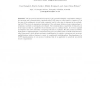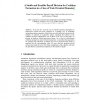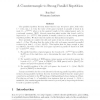1653 search results - page 67 / 331 » Computer science and game theory |
ATAL
2009
Springer
14 years 3 months ago
2009
Springer
In hedonic games, players have the opportunity to form coalitions, and have preferences over the coalitions they might join. Such games can be used to model a variety of settings ...
PKC
2009
Springer
14 years 9 months ago
2009
Springer
Abstract. We propose an asynchronous protocol for general multiparty computation with perfect security and communication complexity O(n2 |C|k) where n is the number of parties, |C|...
HICSS
2007
IEEE
14 years 3 months ago
2007
IEEE
This paper analyzes the retrospective stories of a four person team responsible for developing a new computer game for mobile phones. Our theorizing is based on an in-depth, two y...
ATAL
2001
Springer
14 years 1 months ago
2001
Springer
In the last few years the use of coalition formation algorithms in multi-agent systems has been proposed as a possible way of modelling autonomous agent cooperation. Game theory pr...
FOCS
2008
IEEE
14 years 3 months ago
2008
IEEE
The parallel repetition theorem states that for any two-prover game, with value 1 − (for, say, ≤ 1/2), the value of the game repeated in parallel n times is at most (1 − c)�...



